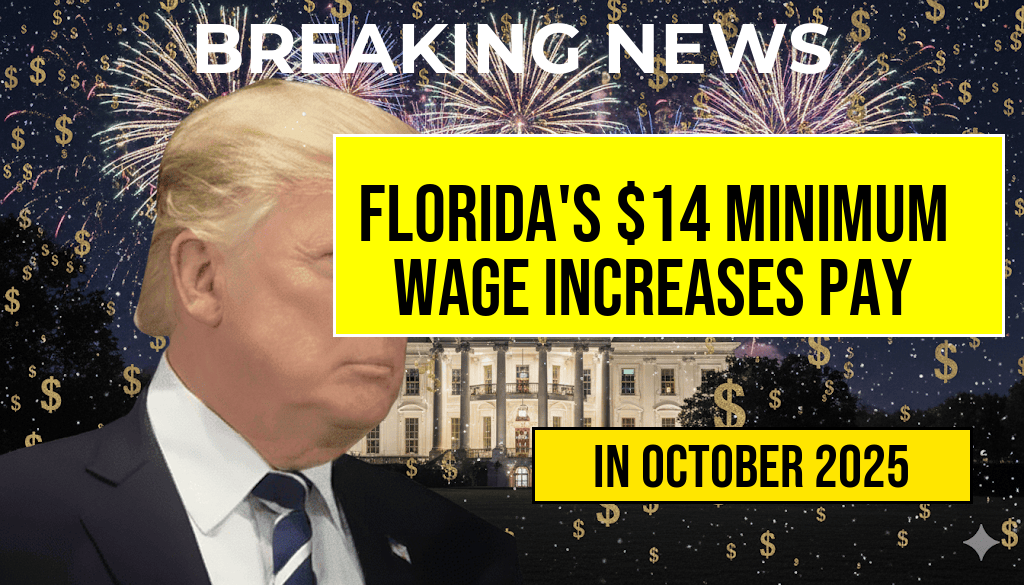Beginning January 1, 2024, Florida’s minimum wage will rise to $14 per hour, a change expected to significantly impact the earnings of full-time workers across the state. This increase, part of a gradual plan to reach $15 per hour by 2026, is projected to add approximately $2,080 to the annual income of those employed full-time at the minimum wage. Governor Ron DeSantis signed the legislation, emphasizing the need for fair compensation amid rising living costs. Advocates argue that the hike will not only benefit workers but also stimulate local economies, while opponents caution about potential consequences for small businesses struggling to keep up with labor costs.
The Minimum Wage Increase Explained
The adjustment to Florida’s minimum wage is part of a broader initiative approved by voters in 2020, which aims to gradually raise the wage to $15 over several years. The increase to $14 represents a $1 jump from the previous rate of $13, marking the latest step in this phased approach. As of now, the minimum wage for tipped employees will also see a corresponding adjustment.
Impact on Workers
For full-time employees earning minimum wage, the increase to $14 per hour translates to a substantial annual raise. Specifically, employees working 40 hours per week will see their yearly earnings rise from approximately $27,040 to $29,120. This additional income can significantly help families manage rising costs of living, especially in urban areas where housing and everyday expenses have surged.
- Current Minimum Wage: $13/hour
- New Minimum Wage (2024): $14/hour
- Annual Earnings Increase: $2,080
Reactions from Business Owners
While many employees welcome the wage increase, reactions from business owners vary. Small business advocates express concern that the new wage might lead to increased operational costs, potentially resulting in higher prices for consumers or reduced hiring. According to the National Federation of Independent Business (NFIB), the rise in minimum wage has historically posed challenges for smaller establishments, which often operate with thin profit margins.
Some businesses are preparing for the wage change by adjusting their budgets or reevaluating their staffing needs. Others, however, see this as an opportunity to attract talent in a competitive job market. The ongoing labor shortage in various sectors means that offering higher wages could help businesses retain employees and reduce turnover rates.
Economic Considerations
Economic analysts suggest that increasing the minimum wage can have mixed effects on the overall economy. Proponents argue that higher wages boost consumer spending, which is vital for economic growth. A report from the Forbes discusses how increased pay can lead to higher demand for goods and services, ultimately benefiting local businesses.
Conversely, critics warn that significant wage increases may lead to inflationary pressures. If businesses raise prices to accommodate higher labor costs, this could negate some benefits of the wage increase for workers. Analysts will be closely monitoring the economic indicators in the months following the wage implementation to assess its true impact.
Comparative State Minimum Wages
Florida’s new minimum wage aligns with a broader trend of wage increases across the United States. Many states are adopting similar measures to address living costs. The following table illustrates how Florida’s minimum wage compares with those of other states:
| State | Minimum Wage |
|---|---|
| Florida | $14.00 |
| California | $15.50 |
| New York | $15.00 |
| Texas | $7.25 |
| Washington | $15.74 |
Looking Ahead
As Florida approaches the new year, the implications of the increased minimum wage will unfold across various sectors. Community organizations and labor unions are poised to monitor the situation closely, advocating for further wage increases if necessary. For workers, the $14 per hour minimum wage represents a critical step toward financial stability, while for businesses, it presents both challenges and opportunities in an evolving economic landscape.
For more information on the implications of minimum wage changes, you can visit Wikipedia for a comprehensive overview, or refer to NFIB for insights from small business owners.
Frequently Asked Questions
What is the new minimum wage in Florida?
The new minimum wage in Florida is set at $14 per hour.
How much could full-time workers expect to earn annually with the new wage?
Full-time workers could see their annual pay increase by $2,080 with the new minimum wage.
When will the new minimum wage take effect?
The new minimum wage will take effect on a specified date determined by Florida legislation.
Who will benefit from the increase in minimum wage?
The increase in minimum wage will primarily benefit full-time workers earning less than the new threshold.
Are there plans for future increases in Florida’s minimum wage?
Yes, Florida has plans for gradual increases to the minimum wage in the coming years, aiming to reach $15 per hour in the future.






